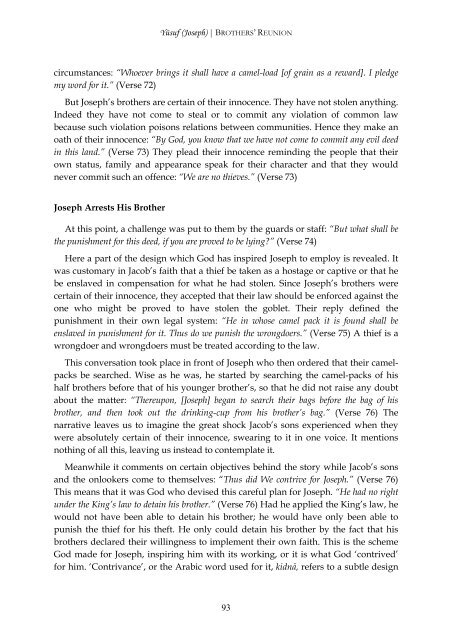Volume 10 Surah 12 - 15 - Enjoy Islam
Volume 10 Surah 12 - 15 - Enjoy Islam
Volume 10 Surah 12 - 15 - Enjoy Islam
Create successful ePaper yourself
Turn your PDF publications into a flip-book with our unique Google optimized e-Paper software.
Yūsuf (Joseph) | BROTHERS’ REUNION<br />
circumstances: “Whoever brings it shall have a camel-load [of grain as a reward]. I pledge<br />
my word for it.” (Verse 72)<br />
But Joseph’s brothers are certain of their innocence. They have not stolen anything.<br />
Indeed they have not come to steal or to commit any violation of common law<br />
because such violation poisons relations between communities. Hence they make an<br />
oath of their innocence: “By God, you know that we have not come to commit any evil deed<br />
in this land.” (Verse 73) They plead their innocence reminding the people that their<br />
own status, family and appearance speak for their character and that they would<br />
never commit such an offence: “We are no thieves.” (Verse 73)<br />
Joseph Arrests His Brother<br />
At this point, a challenge was put to them by the guards or staff: “But what shall be<br />
the punishment for this deed, if you are proved to be lying?” (Verse 74)<br />
Here a part of the design which God has inspired Joseph to employ is revealed. It<br />
was customary in Jacob’s faith that a thief be taken as a hostage or captive or that he<br />
be enslaved in compensation for what he had stolen. Since Joseph’s brothers were<br />
certain of their innocence, they accepted that their law should be enforced against the<br />
one who might be proved to have stolen the goblet. Their reply defined the<br />
punishment in their own legal system: “He in whose camel pack it is found shall be<br />
enslaved in punishment for it. Thus do we punish the wrongdoers.” (Verse 75) A thief is a<br />
wrongdoer and wrongdoers must be treated according to the law.<br />
This conversation took place in front of Joseph who then ordered that their camelpacks<br />
be searched. Wise as he was, he started by searching the camel-packs of his<br />
half brothers before that of his younger brother’s, so that he did not raise any doubt<br />
about the matter: “Thereupon, [Joseph] began to search their bags before the bag of his<br />
brother, and then took out the drinking-cup from his brother’s bag.” (Verse 76) The<br />
narrative leaves us to imagine the great shock Jacob’s sons experienced when they<br />
were absolutely certain of their innocence, swearing to it in one voice. It mentions<br />
nothing of all this, leaving us instead to contemplate it.<br />
Meanwhile it comments on certain objectives behind the story while Jacob’s sons<br />
and the onlookers come to themselves: “Thus did We contrive for Joseph.” (Verse 76)<br />
This means that it was God who devised this careful plan for Joseph. “He had no right<br />
under the King’s law to detain his brother.” (Verse 76) Had he applied the King’s law, he<br />
would not have been able to detain his brother; he would have only been able to<br />
punish the thief for his theft. He only could detain his brother by the fact that his<br />
brothers declared their willingness to implement their own faith. This is the scheme<br />
God made for Joseph, inspiring him with its working, or it is what God ‘contrived’<br />
for him. ‘Contrivance’, or the Arabic word used for it, kidnā, refers to a subtle design<br />
93

















